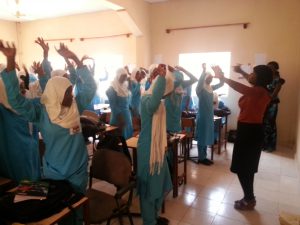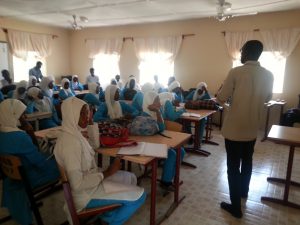On the left you see what I think of as The Gambian version of the Hokey Pokey. I wish I had a video. On the right is more of a lecture approach. These and other styles were used to teach about a variety of subjects. The right to an education, privacy, freedom of association, human trafficking and other issues were addressed by our student teams.
We allowed the teams to focus on what they thought was important. They had to teach about the law, as we understand it to be in The Gambia, not cultural or religious practices or norms. They had to focus on legal rights that rise to human rights. The goal is for youth to be able to recognize rights and help themselves or others protect them.
Some students did not agree on the law in relation to some topics, like child marriage and FGM. Students who disagreed on what the law was did not have to teach on those topics. The goal is for children to be able to recognize rights and help themselves or others protect them. In cases where there may be a conflict of laws, eventually the courts should resolve that difference. For example, some students taught that the law bans child marriage. Specifically, they had to talk in terms of the constitution and child protection laws that require a person be at least 18 years of age to be married. This raised discussions over the incorporation of Sharia Law into the Constitution of The Gambia, which some students argued meant Muslims could engage in child marriage under certain interpretations of their Sharia Law. All this lead to some heated debates in and out of the classroom. It was a learning experience for us all.
For example, some students (not pictured here) taught that the law bans child marriage. Specifically, they had to talk in terms of the constitution and child protection laws that require a person be at least 18 years of age to be married, an older threshold than allowed in at least some of the United States when parents give permission. This raised discussions over the incorporation of Sharia Law into the Constitution of The Gambia. Some students argued this meant Muslims could engage in child marriage under certain interpretations of their Sharia Law. All this lead to some heated debates in and out of the classroom. It was resolved so the clinic could go on. It was a learning experience for us all.


